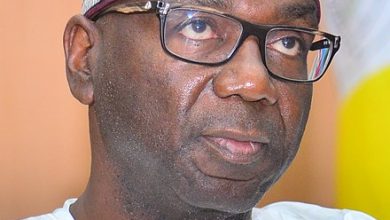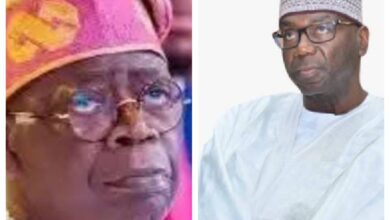Saraki@57: A man and his nation’s anti-graft war

With Yusuph Olaniyonu
Today, Dr. Abubakar Bukola Saraki, the 13th and third longest serving President of the Nigerian Senate turns 57. The son of the Second Republic Senate Leader and third person to be elected into the Senate in his immediate family is not holding any public office at the moment. He therefore will have more time to reflect on his life as a husband, father, grandfather, having just got a grandchild three weeks ago, political leader, a leader of the party in opposition, the nightmare of the current establishment, particularly the Lagos wing of that establishment, and a politician frequently being assailed by the power that be.
This period should allow Saraki to ruminate and introspect into how come there is a desperate bid to stereotype him and frame him as the culprit for anything the current Buhari Government is not getting right.
The establishment in Nigeria is smart at doing something. It writes a script and carve out a role for its most loathed opponents and its members go all out to market the script and make the opponents the devils that are responsible for the failure of the establishment. It is for this reason that the establishment in the country never deliver on good governance or provision of social services to the people. Its members spend more time working on the script to destroy the anti-establishment fellows and devote more than enough resources to bring down their opponents by de-marketing them and making them look like a monster, than they spend on thinking through and initiating solutions to the problems of the country.
It is the establishment’s script that presented late Chief Obafemi Awolowo as a ‘tribalist and rigid’ man. It tried to destroy Alhaji Lateef Jakande, perhaps the Governor with the greatest achievements in service delivery to the people in the history of Nigeria, by labeling him an ‘Abacha man’. The same establishment created the label of ‘an irritant noisemaker’ for Chief Gani Fawehinmi. This establishment painted President Goodluck Ebele Jonathan as ‘clueless, spineless and Ijaw-centric’. It branded Atiku Abubakar as ‘corrupt and always ready to compromise’, even though no single case of corruption has been proven against the man.
In this ‘shoot them down or paint them black’ tactic, the establishment has become more potent, deadly and daring with the advent of social media. Instead of creating productive jobs for the youths, they have created a group of young people who they call ‘social media warriors’, earning some pittance every now and then, but deployed on a daily basis to shoot down their opponents.
Their current target is today’s birthday boy. They are pulling no stop to label him as “corrupt” and the one who has done much to ‘undermine the anti-corruption war’. They concoct scenarios, figures and situations to strengthen this message. They deploy resources in billions of Naira, and manpower, in hundreds of young and old people, in aid of the project. Institutions that should be otherwise neutral and focused are abused, process thwarted and rules bastardized in the process of blackmailing Saraki and painting him black. Their motivation is either rooted in the past going back to 2014-2015 or looking forward to the future of what happens in 2023. Well, human beings are not God. That remains the source of strength for those who believe.
However, they have met their match in the man who has decided to fight for his turf and reject false stereo-typing. Saraki seeks to lay the facts bare and reminds Nigerians the truth which they have forgot. On corruption, the man has made it clear that those accusing him are not half as clean as he is. They also have not done as much as he has done to create institutional and personal transparency in government. At every point, he has challenged people to interrogate and review his records and efforts at strengthening the fight against corruption and ensuring that instead of building strong men within the campaign, we should build strong institutions and utilize key technology to deter the dirty ones among us.
We may do well to remember that Saraki is a man who at every point in his public service has sought to institute transparency and accountability in governance. As a Special Assistant to then President Olusegun Obasanjo on budget matters, between 2000 and 2002, he initiated the passage of the Fiscal Responsibility Act and Public Procurement Act. Both laws were aimed at ensuring macro-economic stability and efficiency in government procurement through greater accountability and transparency.
As Governor of Kwara State, he waived his immunity to enable his administration be probed. He is, perhaps, the most investigated individual, in the nation’s democratic history. However, each time, Saraki has been given a clean bill of probity and health. It should be noted that seven separate investigations were instigated on Saraki during his time in office as Governor. In September 2006, Mallam Nuhu Ribadu, then Chairman of EFCC, took to the floor of the Senate to give a clean bill to six states, of which Kwara State where Saraki was then Governor was one. Under Ribadu’s successor, Farida Waziri’s Chairmanship, Local Government Councils in Kwara State were investigated in 2010 when Dr Saraki joined the presidential race.
During his Governorship years, he introduced the Price Intelligence Unit, the first by any state government. This unit reduced leakages in government revenues and introduced transparency and efficiency in government procurement. The idea was later adopted by the Federal Government as it became the Bureau of Public Procurement (BPP). As chairman of the Nigeria Governors’ Forum (NGF), Saraki later influenced the adoption of that law by many of the states. Kwara State under his governorship was the first state to be rated by Fitch, the global rating agency which affirmed its National Long term rating at AA-(minus) and ratings of B+ in public finance transparency.
At the end of his tenure in 2011, the anti-corruption agency did not find any reason to invite him for any questioning, even though his colleagues who also just left the Governorship posts were interrogated and some of them were charged to court. It was more than a year after he left office when he moved the controversial motion calling for investigation into fuel subsidy that the EFCC first invited him for investigation and nothing came out of that effort. Similarly, four years after he left office and was elected Senate President against the wish of the establishment, he was again charged to the Code of Conduct Tribunal based on alleged irregularities in his assets declaration forms as Governor. Also, now, eight years after he left office as Governor and having concluded his term as Senate President, the anti-graft agency has decided, once again, to raise issues over his term as Governor.
Saraki in his first term in the Senate was the one who through a motion on the floor exposed the biggest fraud in the country then. That is the oil subsidy scam. It was an action which set him against the Presidency controlled by his party. Consequently, he was investigated by the Special Fraud Unit (SFU) at the conclusion of which the Federal Ministry of Justice issued a letter clearing his name of any wrongdoing.




